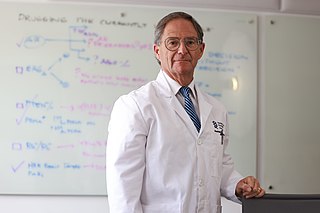
The National Institutes of Health, commonly referred to as NIH, is the primary agency of the United States government responsible for biomedical and public health research. It was founded in the late 1880s and is now part of the United States Department of Health and Human Services. Many NIH facilities are located in Bethesda, Maryland, and other nearby suburbs of the Washington metropolitan area, with other primary facilities in the Research Triangle Park in North Carolina and smaller satellite facilities located around the United States. The NIH conducts its own scientific research through the NIH Intramural Research Program (IRP) and provides major biomedical research funding to non-NIH research facilities through its Extramural Research Program.
The National Cancer Institute (NCI) coordinates the United States National Cancer Program and is part of the National Institutes of Health (NIH), which is one of eleven agencies that are part of the U.S. Department of Health and Human Services. The NCI conducts and supports research, training, health information dissemination, and other activities related to the causes, prevention, diagnosis, and treatment of cancer; the supportive care of cancer patients and their families; and cancer survivorship.
Tak Wah Mak, is a Canadian medical researcher, geneticist, oncologist, and biochemist. He first became widely known for his discovery of the T-cell receptor in 1983 and pioneering work in the genetics of immunology. In 1995, Mak published a landmark paper on the discovery of the function of the immune checkpoint protein CTLA-4, thus opening the path for immunotherapy/checkpoint inhibitors as a means of cancer treatment. Mak is also the founder of Agios Pharmaceuticals, whose lead compound, IDHIFA®, was approved by the FDA for acute myeloid leukemia in August 2017, becoming the first drug specifically targeting cancer metabolism to be used for cancer treatment. He has worked in a variety of areas including biochemistry, immunology, and cancer genetics.

Movember is an annual event involving the growing of moustaches during the month of November to raise awareness of men's health issues, such as prostate cancer, testicular cancer, and men's suicide. It is a portmanteau of the Australian-English diminutive word for moustache, "mo", and "November". The Movember Foundation runs the Movember charity event, housed at Movember.com. The goal of Movember is to "change the face of men's health."
The American Association for Cancer Research (AACR) is the world's oldest and largest professional association related to cancer research. Based in Philadelphia, the AACR focuses on all aspects of cancer research, including basic, clinical, and translational research into the etiology, prevention, diagnosis, and treatment of cancer. Founded in 1907 by 11 physicians and scientists, the organization now has more than 58,000 members in 142 countries and territories. The mission of the AACR is to prevent and cure cancer through research, education, communication, collaboration, science policy and advocacy, and funding for cancer research.

Moffitt Cancer Center & Research Institute is a nonprofit cancer treatment and research center located in Tampa, Florida. Established in 1981 by the Florida Legislature, the hospital opened in October 1986 on the University of South Florida's campus. Moffitt is one of two National Cancer Institute-designated Comprehensive Cancer Centers based in Florida. In 2021, U.S. News & World Report ranked Moffitt Cancer Center as a top 30 cancer hospital in the United States.
The Triple Negative Breast Cancer Foundation is a nonprofit organization dedicated to raising awareness of triple negative breast cancer. The foundation supports scientists and researchers in their efforts to determine the definitive causes of triple negative breast cancer so that effective detection, diagnosis, prevention, and treatment can be pursued and achieved.

Bedford Research Foundation is a non-profit Institute that conducts stem cell research for diseases and conditions that currently have no known cure. The institute also created the Special Program of Assisted Reproduction (SPAR), a program that assists serodiscordant couples successfully achieve pregnancy. Dr. Ann Kiessling, the founder of Bedford Stem Cell Research Foundation, is the Laboratory Director.

Stand Up to Cancer (SU2C) is a charitable program of the Entertainment Industry Foundation (EIF). SU2C aims to raise significant funds for translational cancer research through online and televised efforts. Central to the program is a telethon that was first televised by four major broadcast networks in over 170 countries on September 5, 2008. SU2C raised over $100 million after that evening's broadcast. Funds collected by Stand Up to Cancer are then distributed by the American Association for Cancer Research.

The mission of the Foundation Fighting Blindness is to fund research that will lead to the prevention, treatment and cures for the entire spectrum of retinal degenerative diseases, including retinitis pigmentosa, macular degeneration, Usher syndrome, Stargardt disease and related conditions. These diseases, which affect more than 10 million Americans and millions more throughout the world, often lead to severe vision loss or complete blindness.

Jonathan W. Simons is an American physician-scientist, medical oncologist, and leader in prostate cancer research. In August 2021, Simons was appointed the medical director and Chief Science Officer of the Marcus Foundation. Prior to joining the Marcus Foundation, he served a 14-year tenure as the President and chief executive officer of the Prostate Cancer Foundation. Simons’ laboratories, partly funded by the Prostate Cancer Foundation, at Johns Hopkins University and Emory University made original contributions to understanding the molecular biology of prostate cancer metastasis and principles of “broken immune tolerance” via T cell based immunotherapy for prostate cancer. The Simons lab invented GM-CSF genetically engineered vaccines for prostate cancer in rodents and humans for these studies, and subsequently Simons’ clinical team took the biotechnology into the world’s first human gene therapy clinical trials for advanced prostate cancer at Johns Hopkins.

Athletes for a Cure is a fundraising and awareness program of the Prostate Cancer Foundation. The organization assists athletes in their quest to raise money for better treatments and a cure for prostate cancer. Athletes for a Cure was founded in 2006.

Brian J. Druker, M.D. is a physician-scientist at Oregon Health & Science University (OHSU), in Portland, Oregon. He is the chief executive officer of OHSU's Knight Cancer Institute, JELD-WEN Chair of Leukemia Research, Associate Dean for Oncology in the OHSU School of Medicine, and professor of medicine.

Genta Incorporated was a biopharmaceutical company started in La Jolla, California, which discovered and developed innovative drugs for the treatment of patients with cancer. Founded in 1989 by a highly skilled entrepreneur, the company focused on a novel technology known as antisense, which targets gene products that are associated with the onset and progression of serious diseases. At that time, only Ionis Pharmaceuticals, Inc. was conducting significant research with this technology. Antisense is a short span of oligonucleotides – modified DNA structures ranging from about 12-24 bases that selectively bind to specific RNA. The intent is to block expression of an aberrant protein that contributes to the disease of interest. Genta in-licensed three different antisense molecules that blocked Bcl-2, a fibroblast growth factor (FGF), and the gene c-myb, respectively.
Rosetta Martiniello-Wilks is an Australian cancer researcher. She is a former senior lecturer at the University of Technology Sydney (UTS) in Ultimo, Sydney, Australia. Martiniello-Wilks was a core member of the Centre for Health Technologies at UTS and head of the Translational Cancer Research Group in the School of Medical and Molecular Biosciences, Faculty of Science, UTS.
Colleen Nelson is a scientist in prostate cancer research. She founded and directs the Australian Prostate Cancer Research Centre – Queensland (APCRC-Q). The Centre, based at the Translational Research Institute and the Princess Alexandra Hospital, spans the spectrum of discovery of new therapeutic targets and their preclinical and clinical development. She is also Chair of Prostate Cancer Research at Queensland University of Technology (QUT).
This is a historical timeline of the development and progress of cancer treatments, which includes time of discovery, progress, and approval of the treatments.

Padmanee Sharma is an immunologist and oncologist at the University of Texas MD Anderson Cancer Center in Houston, Texas. She holds the position of professor of genitourinary medical oncology and immunology in the Division of Cancer Medicine where she specializes in renal, prostate, and bladder cancers.
Richard Edelson is the Anthony Brady Professor of Dermatology at the Yale School of Medicine. He is a past director of the Yale Cancer Center, and an elected fellow of both the American Society for Clinical Investigation and the Association of American Physicians. He is known for his research discoveries in non-Hodgkins lymphoma, particularly his early career introduction of the disease category concept of Cutaneous T Cell Lymphoma (CTCL), and his discovery of extracorporeal photochemotherapy (ECP) as an immunotherapy for cancer, transplant reactions and autoimmunity.
Amina Zoubeidi is a Canadian research scientist and prostate cancer researcher. She's a scientist at the Vancouver Coastal Health Research Institute and an associate professor in the Department of Urologic Sciences at the University of British Columbia. During her tenure at UBC, Zoubeidi and her research team developed the first drug that targets and blocks BRN2, thus stopping Neuroendocrine prostate cancer (NEPC) tumours and creating a possible treatment for the previously thought incurable disease.












